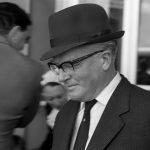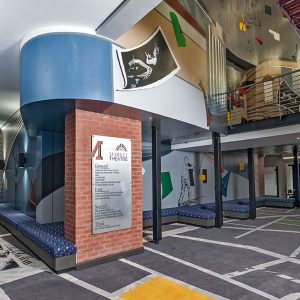Denis Goldberg, a proper mensch and a true hero
The anti-apartheid stalwart was a forthcoming, funny, angry, brutally honest and impressive man who never stopped fighting for what he believed. He spoke his mind, regardless of what others thought…
Author:
1 May 2020

I sheltered with the people in a time of uproar
And then I joined in their rebellion.
That’s how I passed my time that was given to me on this Earth. – Bertolt Brecht, To Those Born After
When he was interviewed for a documentary in 1990 while living in England, Rivonia Trialist and former political prisoner Denis Goldberg read these lines to explain to his interviewers how he viewed the way that he had passed his time on Earth in the service of the struggle against apartheid and political oppression generally.
They were apt for a man whose life served as an example for others of a complete commitment to the greater good and prosperity of his fellow countrymen. Goldberg was then 57 years old and had spent just over 22 years in prison in Pretoria before being released in 1985. His wife Esme and their two children, Hilary and David, had lived in England for the duration of his imprisonment and in spite of the release of Nelson Mandela and the unbanning of the ANC, Goldberg did not at that stage see himself returning to South Africa because his wife and family no longer saw it as their home.
He would not return to South Africa until 2002, after Esme’s death in 2000 and his daughter Hilary’s sudden death two years later. For the remainder of his life, which ended on the night of Wednesday 29 April 2020, Goldberg remained fiercely dedicated to the fight against inequality and oppression that he had waged for most of his 87 years.
Student politics
Goldberg was born in Cape Town in 1933. His parents Sam and Annie had both been born in London, the children of Lithuanian Jews who had left the Pale of Settlement to escape the Russian pogroms. Sam and Annie were active communists in London before they came to South Africa, settling in the suburb of Observatory and playing an active role in the Woodstock branch of the South African Communist Party.
Denis and his older brother Allan were raised with a keen awareness of injustice, inequality and the urgency of the ideological battles that were being fought during World War II. He grew up dreaming of becoming an engineer and building a great work for the benefit of mankind in the vein of the Suez Canal. At the age of 16, he enrolled at the University of Cape Town to pursue that dream. But soon he was involved in student politics on campus through his membership of the Modern Youth Society (MYS) and then met a young woman and fellow MYS member during his final year named Esme Bodenstein, who would shortly become his wife.
In 1957, Goldberg joined the Communist Party. In 1961, he became a member of Umkhonto weSizwe (MK). He had already experienced his first prison spell in 1960 when he and his mother were arrested for their involvement in supporting strikers in the townships in the wake of the Sharpeville massacre. Goldberg and his mother spent four months in detention without trial.
Related article:
In 1962, he and fellow MK comrade Looksmart Ngudle organised the first MK training camp in South Africa at Mamre outside Cape Town. Ngudle would later become the first person to die in detention when he was found hanged in his cell in Pretoria Prison in September 1963.
Goldberg was arrested on 11 July 1963 at Liliesleaf Farm. He was part of the MK underground command that was busy planning for Operation Mayibuye, which intended to violently overthrow the apartheid regime. As an engineer, Goldberg had been tasked with manufacturing the arms necessary for the task. He was the youngest of the accused at the Rivonia Trial and when he was sentenced to four life sentences in 1964, his mother, who was unable to hear the judge, asked her son, “What did the judge say?”, to which he famously replied, “Life, and life is wonderful.”
A soldier no more
Esme and his children left for the United Kingdom and Goldberg would only see them a handful of times and under strict restrictions over the course of his imprisonment. His parents both died while he was in prison and it was not until the day before his release in 1985 that Goldberg would be allowed to visit his father’s grave.
Two years after his arrival at Pretoria Central, Goldberg was joined by his former Rivonia lawyer Bram Fischer, who had been sentenced to life imprisonment for furthering the aims of communism and conspiring to overthrow the apartheid government. When Fischer fell victim to cancer in 1974, Goldberg was instrumental in caring for Fischer, recording his treatment at the hands of warders, moving into his cell to care for him and pushing for him to be released under house arrest. This request was eventually granted, allowing Fischer to see out his final days at his brother’s house in Bloemfontein, where he died in 1975.
Related article:
I ate my dinners between the battles,
I lay down to sleep among the murderers,
I didn’t care for much for love
And for nature’s beauties I had little patience.
That’s how I passed my time that was given to me on this Earth. – Bertolt Brecht.
In 1985, Goldberg’s daughter Hilary was living on a kibbutz in Israel where a committee had been established to put pressure on the South African government to have her father released. After an intense period of negotiation between Israeli activists, the apartheid government and communication with his comrades in the ANC, Goldberg agreed to a condition from then president PW Botha that his release was contingent on a commitment that he would not participate in violent action for political ends.
As Goldberg recalls in his 2010 autobiography, The Mission, to accept this condition “was not a statement repudiating my role in the armed struggle. It was not an apology for having been involved in taking up arms against the state. Nor was I saying that the armed struggle was wrong. I was simply saying that I would not be a soldier any more – and it took me days and nights to work that out.”
Exile in London
Upon his release, Goldberg was taken straight from prison to the airport in Johannesburg and flown to Israel, where he met his family on the tarmac at Ben Gurion airport in Jerusalem. In spite of the role that Israeli activists had played in helping secure his release, Goldberg remained, throughout his life, steadfastly opposed to the country’s treatment of Palestinians and its nefarious dealings with the apartheid regime.
Days when we were used to changing countries
More often than shoes,
Through the war of the classes despairing
That there was only injustice and no outrage. – Bertolt Brecht
From exile in London, Goldberg threw himself straight back into the work of the struggle, rallying support for the Anti-Apartheid Movement and the call for sanctions against the South African government. After the 1994 elections, Goldberg continued to work from London, establishing Community HEART, a development organisation that raised money to help improve the lives of South Africans through various community-based projects.
In 2002, Goldberg returned to South Africa with his second wife, Edelgard Nkobi, to take up a position as special adviser to then minister of water affairs and tourism Ronnie Kasrils. After a subsequent stint as adviser to Kasrils’ successor, Buyelwa Sonjica, Goldberg retired from public life but remained committed to community activism for the remainder of his life.
Arts and culture
He was always campaigning for the betterment of the lives of all South Africans and never steered clear of taking to task those members of the ANC whom he felt were letting down the ideals for which he and his generation of activists had fought. At a 2008 ceremony for the opening of the Liliesleaf Museum in Johannesburg, an impish but deadly serious Goldberg warned then president Jacob Zuma not to allow the civil service to be used for the enrichment of government officials at the expense of the people it was meant to serve.
He spent the last years of his life devoted to promoting arts and culture in Hout Bay, where he lived and established the Denis Goldberg Legacy Foundation Trust to build the Denis Goldberg House of Hope, an arts and educational centre. As he wrote in the conclusion to his autobiography: “For me, personally the work continues within my community to try to realise in practice the vision we had that our children shall not be hungry, shall be well cared for, go to school, have jobs to go to and to be able to laugh a little.”
Related article:
And in the future when no longer
Do human beings still treat themselves as animals,
Look back on us with indulgence. – Bertolt Brecht
Goldberg was diagnosed with lung cancer in 2018 and while doctors didn’t give him much time, he was, as he told The Sunday Times newspaper on the eve of his 85th birthday, “still full of life”. He died on Wednesday morning and is survived by his son David, two granddaughters and a grandson who all live in England.
In Yiddish, the word mensch means a person of integrity and honour, someone noble who should be emulated. As Archbishop Desmond Tutu said this week in his tribute: “Denis Goldberg was a mensch, a human being of the highest integrity and honour who eschewed personal aggrandisement and consumptiveness. His lifetime contribution to South Africa and its people was second to none. His passing, conducted with customary courage and grace, feels as if the nation has lost part of its soul.”



